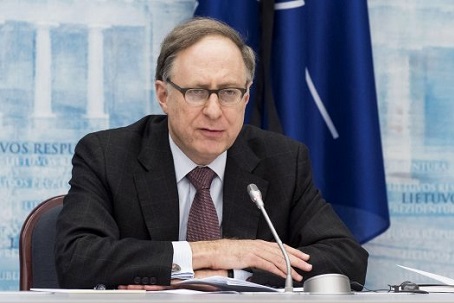NATO high official: “Russia’s strategy in the Black Sea threatens to challenge our unity”

Deputy Secretary General of the North Atlantic Treaty Organisation (NATO) has spoken out about the challenges facing the Black Sea region, mainly Russia’s continuing efforts to pressure its neighbours and challenge international laws.
Speaking in Sofia, Bulgaria today at the Atlantic Club of Bulgaria Conference on Black Sea, NATO Deputy Secretary General Alexander Vershbow stressed the importance of the Black Sea region for Euro-Atlantic security and how the Alliance was responding to the current threats.
Significantly, we face strategic threats from two different directions at the same time. On one hand, a more assertive Russia is challenging international law and the sovereignty of its neighbours … [and] on the other hand instability and violence in our southern doorstep risks spilling over into Allied territory in the form of terrorism and uncontrolled migration”.
The NATO high official underlined both challenges were of "great concern” however NATO knew how to respond to these challenges in a peaceful manner. He noted NATO had stepped up its efforts to "project stability” across the region as a whole by expanding the Alliance’s efforts to build greater defence capacity.
Training, advising and assisting local forces so they are better able to secure their own countries and, where appropriate, to support and train others,” he said.
During his address Vershbow said Russia’s actions were "of course of paramount concern”, and named the illegal annexation of Ukraine’s Crimea, coupled with a major militarisation on the occupied peninsula including the modernisation and enlargement of the Black Sea fleet, as threats to regional stability.
He stressed these actions "gravely destabilised the security landscape” in the Black Sea area.
The Kremlin’s underhanded involvement in the wider region – including in "frozen” conflicts in NATO’s partner countries Georgia and Moldova – threatens to prolong instability indefinitely,” he added.
Vershbow believed Russia’s provocative strategy in the Black Sea was part of a global effort that stretched from the high Arctic to the deserts of Syria, and this effort threatened to challenge the Alliance’s unity, as well as its territorial integrity.
Our response therefore has two key elements: To strengthen our defence and deterrence and to seek to engage in dialogue with Russia with a view to demonstrating that we are united and resolute, but determined to reduce the risk of conflict through transparency and predictability,” Vershbow said, stressing the Alliance was not interested in war or military confrontation.
Vershbow said NATO would continue to provide support to its partners in the region, in particular Ukraine and Georgia, as both countries continued to face "significant pressure from Russia”.
The Alliance is engaged with both countries through a series of partnership instruments and we are helping, where we can to bolster their political independence and territorial integrity,” Vershbow said.
He said NATO was closely cooperating with the Ukrainian military to strengthen maritime and airspace security while a wide range of measures were included in the Substantial NATO-Georgia Support Package.
Vershbow also added NATO was helping to support better coordination between the Georgian Interior and Defence Ministries in order to strengthen the capacity of the Georgian Coast Guard.
 Tweet
Tweet  Share
Share